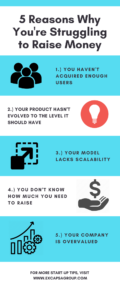For startups, fundraising is a daily battle. The constant phone calls, cold emails, networking events, and meetings can feel like a laborious cycle of a scripted outlook on your company’s current and future success. In yet, even with it being a challenge all entrepreneurs face, sometimes it feels like we’ve struck out a little too many times.
However, while sometimes it’s just sheer bad luck (or location), most of the time that’s not necessarily the case. In fact, there are a few things VC’s and Angels mainly look for that you just might be missing the mark on:
You haven’t acquired enough users
In most developed companies (I.E.: post-seed round), this is one of the first things an investor looks for. Users on your product or service gives them a gauge of traction, as well as how your marketing efforts have fared so far. Additionally, the quality of engagement is another factor in how your users are behaving with your platform.
As some companies have had exceptional initial launches, they lose so much after their first buzz. This position can be risky for investors, especially if the startup is looking for funding as a way to pick up steam. Even if that’s the case, it’s important to note that most investors in this situation are looking more for how much you’ve learned from your user base rather than how many people have signed up/engaged. If you’re able to provide a solid plan on how to improve, then moving past this hurdle should be a breeze.
Your product hasn’t evolved to the level it should have yet
As we try to perfect every single element of what we’ve built, sometimes it’s still not at the necessary level for investors to pull the trigger. While it requires some practice and patience, this isn’t a bad place to be in as the rewards can be much more lucrative down the road.
When you think about it, a product that hasn’t quite hit the threshold for even the most conservative of investors is a good sign. After all, sometimes the best ideas need a solid foundation to be built off of, and that’s exactly what they’re providing you with this feedback. Take some time to genuinely create something they’d want to call their own just as much as you do, and they’ll reconsider in no time.
Your model lacks scalability
Even if you’ve been in business for years, your business model just might not be as scalable as you thought. As embarrassing this may seem, it can be the perfect opportunity to take a different route.
The first fix would be to readjust your model and strategy with the same core technology and philosophy to a wider range of customers. Although that’s not always applicable, taking what you’ve learned and applying to something new can always be an advantageous place as an entrepreneur, as that experience is invaluable. This can potentially mean a new venture in either the same market or industry, or discovering a completely new inspiration you never thought of.
You don’t know how much you actually need to raise
While it may sound silly, a lot of startups have a tough time gauging how much money is necessary for them to move forward. Some of this is due to a lack of knowledge, such as not knowing the difference between seed or pre-seed, as well as not accurately factoring in equity. Fundraising can already be a hectic enough environment as it is, so it’s imperative to be concise regarding the exact amount of money you need and why you need it. Finally, being able to take a leaner approach in raising funds will show that you’re committed to this idea or product in the long run, not looking for a test to “see how well this will work.”
Your company is overvalued
This is a similar point to knowing how much to raise; only it examines in more detail the ideas of market potential and scalability in comparison to how much this could exit/IPO for. Valuation is a tricky subject as we’re only able to compare it to other start-ups either with a similar model or in the same field.
With that, gauging how well your product is going to do is also dependent upon the people built behind it. To really assess the value, take into account the scalability, market potential/size, quality of a team, and where the fundraising is taking place. Everything that’s contributed has a value, and that’s something your investors should recognize too.


